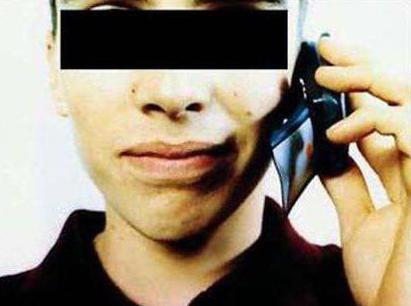In recent years, Russian law enforcement agencies have increasingly come across the term "telephone terrorism." Article of the Criminal Code of the Russian Federation under number 207 contains all the necessary information that can provide an exhaustive explanation regarding this problem.
Essence of the question
First you need to figure out what “telephone terrorism" really is. An article of the Criminal Code of the Russian Federation on this subject gives a comprehensive explanation. This term implies the actions of citizens who intentionally provide knowingly false information regarding an impending act of terrorism.

According to the applicants, this could be an arson, explosion or other situations that pose a certain threat to people's lives or serious material (property damage), or other consequences that are dangerous to society. As a rule, such calls come from payphones. This is very convenient and safe, since such a method has two main positive points:
- conspiracy (calls from public telephones are extremely difficult to track);
- material benefit (contact emergency services free of charge).
Nowadays, there are many different devices used by violators accused of “telephone terrorism”. The article of the Criminal Code does not contain a list of them. However, in practice, criminals often use:
- special devices for changing voice;
- prepaid phones;
- fake SIM cards.
In addition, information can be sent from a computer (e-mail), by regular letter or SMS message. This further complicates the ability to search for an intruder.
Goals and intentions
A person committing a particular act seeks to achieve a specific goal. What, then, is “telephone terrorism” aimed at? The article of the Criminal Code of the Russian Federation does not give a clear answer to this question. Nevertheless, practice shows that this is done:
- To temporarily disrupt the work of specific organizations or enterprises. For example, there are situations when students called and reported a bomb planted in the school building to disrupt the upcoming test.
- To intentionally divert the attention of special services from their immediate work.
- Just out of hooligan motives.
Sometimes such violators are confused with “prankers”. This word comes from the English prank, which means a trick, a joke or an innocent prank. But such people just for the sake of their own fun make fun of the interlocutor, bringing him to a frank conversation, the recording of which is then posted on the Internet. Their actions are actually almost harmless telephone hooliganism. The situation is different with terrorists.
Undesirable consequences
What is so dangerous "telephone terrorism" and its consequences? The actions of such jokers are capable of:
- Create a temporary disruption or partial disorganization of the work of a particular enterprise. This may be a train station, factory, airport or any institution, the omission of which in some cases could result in serious losses.
- To provoke a serious panic, which, with a large crowd of people, can even lead to human casualties.
- Distract emergency services from solving really important problems. People who really need help will not be able to get it on time.
- After repeated false statements by the special services, the truth of each subsequent call will be called into question.

To prevent such situations, all incoming conversations are recorded in the police stations, and caller IDs are installed, with the help of which it will be easy to establish the whereabouts of a bully or a joker.
Fair retaliation
Article 207 of the Criminal Code of the Russian Federation contains detailed information about what punishment awaits an unlucky terrorist. If the damage from the actions of the telephone bully is insignificant, then on the basis of part 1 he can expect:
- a fine of up to 200 thousand rubles, or the total amount of income for a period of up to 18 months;
- compulsory work no more than 480 hours;
- correctional labor from 1 to 2 years;
- forced labor or restriction of liberty for a period not exceeding 3 years;
- arrest up to 6 months;
- maximum 5 years imprisonment.

If the damage from the actions of the violator is recognized as large (more than 1 million rubles), then in accordance with part 2 of this article, he will face the following punishment:
- a fine (either up to 1 million rubles, or in the amount of the total amount of income from one and a half to 3 years);
- complete imprisonment for up to 5 years.
The final amount of punishment is determined by the court after the relevant proceedings, considering all the evidence in the case.
